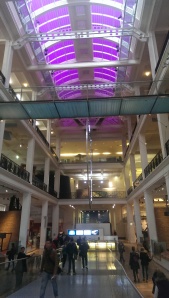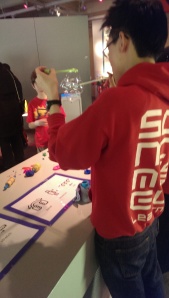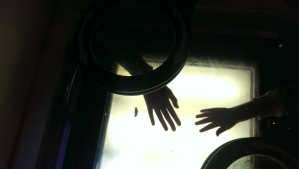I am back at the Science Museum again, on my own, without the kids. They get very jealous when I come on my own, I have to make a conciliatory visit to the shop every time. Our 8 Sea Monkeys called Dave, bought on my last trip, have unfortunately not survived, but to be honest I am reluctant to buy more, their impromptu funeral is still fresh in my mind. Slightly distracted by the thought of Sea Monkeys, I pull myself back to reality, I am getting used to visiting these days, many years with no visits at all and now I am in and out with surprising frequency.
I have not come to visit for an event or exhibition, I have come to meet the staff who run the ‘Early Birds’ autism friendly programme. I have written about the programme in other posts which you can read on my blog, so I won’t go into much detail here about what happens on their early morning openings. Today I am focussing on the fantastic news that the events are going to be funded for another 3 years by the Lord Leonard and Lady Estelle Wolfson Foundation. It is wonderful to hear this, these events are so important, providing a way for many families with autistic children to visit the museum for the first time, so I am really pleased to find out more about their plans going forward.
The Science Museum have also kindly agreed for me to interview staff who work on ‘Early Birds’, I am really interested to see things from their point of view. How does their training help them prepare for the event? What did they know about autism before they worked ‘Early Birds’, and how is it different to working on their regular family programme? I am meeting Chris Whitby, a full-time Learning Audience Researcher and Advocate, who has been at the Science Museum for 4 years and I am so thrilled, if a little nervous, that he is happy to have a chat.
Initially I spend time with Kate Mulcahy and Anna Fisher to discuss their plans for the future over a cup of tea in the cafe when Chris comes to join us. We have met virtually on Twitter, but it is so much nice to meet someone in reality! Introductions over, Kate and Anna leave us to it, it is nice to feel there is freedom to talk, I feel I can perhaps ask those more difficult questions like whether he has had any problems when working the ‘Early Birds’.
To begin with I ask whether he knew much about autism before he had training and worked the event. He tells me his mother has a social services background and so was broadly aware of what autism is and what it can mean for individuals and families. We moved on to the training that all staff received before the first event. I had heard about this from Kate, but I was interested to hear what it had involved and how that training and knowledge had prepared Chris, how it might have changed his attitude and understanding of children with autism. I am also interested to know if this training gave him more confidence about what to expect and how to deal with potential problems.
The staff received a kind of crib sheet with information about autism and how it can affect individuals, it was not a prescriptive list of “do’s and don’ts”, but basic information about Autistic Spectrum Condition. Chris talked about the fact there can be anxiety when working with any new audience for the first time, if you are not used to working with children, or older audiences, it is just a part of the unknown, being given information is just part of the process that a good museum should build into their training programmes.
I really liked the fact that the Science Museum put the emphasis on the individual to use their initiative, it is not a hand holding exercise and I can see by talking to Chris that there is a trust in staff and an appreciation of them as practitioners. They already have a great deal of experience of dealing with families in their regular programmes, their training was more things to consider and things to think about.
The Science Museum, perhaps more than any other museum, is perfectly placed to understand the needs of autistic children. There are over 450,000 young people who visit the Science Museum on educational trips or benefit from its outreach programme every year, more than any other UK museum, and 1.5 million coming as part of a family visit (1). Many autistic children are in mainstream school and staff are already helping and providing a supportive environment, they have just distilled this experience and focussed it on to a special event.
I wanted to know if there is any difference between working an ‘Early Birds’ morning compared to a regular event, and I found the answers Chris gave really interesting. The ‘Early Birds’ events are less formal – there is still structure, but there is a freedom for families to choose the type of activity they want to take part in: whether they want to dress up and have a photo taken; build a kit car; or talk to an actor about the bones in the body. I think this is a key to the success of the event, it is the flexibility that allows families to wander around if they want to and just enjoy the museum space, look at the large machines, rockets and cars without having to take part in any activity if they don’t want to. Chris talks about the museum being a ‘social space’, they are aiming for a welcoming, relaxed environment, coming for a visit is more than just coming for a specific event or activity, I think for autistic children, more than any other group, being given the opportunity to enjoy the building and space is so important.
Chris tells me he enjoys the ‘Early Birds’ mornings more than the other events, they are less hectic and more intimate, the lower numbers means he can spend time with the families, talk to the parents, interact with the kids, for him it is fun and not like working at all. I can really sense this by the way he talks about his work, it is not about just earning a living but making a difference to families and young people. It really is amazing how the little things, some time spent listening or the space to show a child how something works can make a real difference.
With all these positives I was interested to know if he had encountered any problems or difficulties when working with autistic visitors. Chris was very honest, no real problems, it can be hard sometimes when an event is finished to tell the children it is over, but that can be true of any event that a child is enjoying. Getting children to queue and take turns in the space gallery where they can get dressed up in space suits and have their picture taken can get a little fraught but again no different to any other event.
The irony is that it is often the regular visitors that can cause the most problems. With ‘Early Birds’, the museum opens up at 8.30am just for autistic families, the galleries open up to the general public at 10.00am but the Launch Pad gallery is kept for ‘Early Birds’ visitors till 11.15am. Chris told me once of a family who came up and wanted to go in the Launch Pad and were quite put out by the fact they couldn’t. He described how hard it is to explain why the galleries are reserved for autistic visitors without making the ‘Early Birds’ visitors feel different or in some way highlighting their disability in the attempt to include them. I think the way autistic families are welcome to stay after the event is one way to avoid that feeling of being invited and yet in some way hidden away. It is such a fine line between inclusion and feeling separated and singled out in a particular group, the balance can easily tip the wrong way, it is hard to get it right.
I asked Chris why he felt it was important that the Science Museum and museums in general run these kinds of events. He talked about museum collections and stories being about all different types of people and they can only really breathe and live if all types of people can access them. Museum need to be inclusive to all, they are social buildings, the space needs to be lived in and experienced for those collections to come alive.
Finally I asked Chris if his view of autism had altered since working on the Early Birds, his answer was refreshingly honest, not really! There was no great sea-change in his thinking or epiphany, but the more we talked I could see there was real change going on, working with autistic visitors was leading him to a different way of working and thinking. The reason the mornings work is because the focus is not on the individual with autism to fit in but on the staff to be flexible and adapt to each situation.
In an environment that is more relaxed and autistic behaviours understood and accepted, staff take their cue from the parents. Autism is so varied that staff can’t know every child, what will work with one may cause problems for another. Sensory difficulties, sounds, lights and smells, who knows where there may be issues, even as parents we are continually kept on our toes. So staff listen and respond, not just to the children but the parents too, we are all working together to make the visit a success, becoming more patient, understanding and adaptable.
I know all about the benefits to the autistic visitors and the parents but what I didn’t expect was the benefits that also come to the staff too. Chris told me spending time with autistic children and their families has influenced every area of his work, it has given him a new awareness, he takes a moment to step back, take a breath and slow things down. It helps him understand a reluctant child on a school trip, that simple appreciation that you can’t always see what is going on in a child’s mind. Not forcing a child to take part, but giving them time and space to join in. It is a wonderful gift, taking time, a moment to try to understand, it is something I strive for but I don’t always reach. To know the team at the Science Museum are learning and growing their skills working with autistic children is just another reason to add to the myriad of reasons why museums should all be running autism friendly events and working to make their environments more supportive.
Chris works the ‘Early Birds’ and he works all kinds of other events too, this is not about specialised staff running special events, with the right training and the right support anyone can do this, it is not magic, it doesn’t take huge piles of cash, it takes a little bit of thought and a little bit time. When it works, it works for my daughter, it works for my whole family, it works for me and now I can see talking to Chris it works really well for him too.
1- http://www.sciencemuseum.org.uk/about_us/history/facts_and_figures.aspx accessed 6 August 2014
xxxxxxxxxxxxxxxxxxxxxxxxxxxxxx
A massive thank you to Kate Mulcahy and Anna Fisher, and of course to Chris Whitby for taking time to talk to me. You can contact Chris on Twitter @commanderwhitby
You can read more about the Early Birds programme on my blog here
The Science Museum page on Early Birds is here
The next Early Birds is on 13th September 2014




